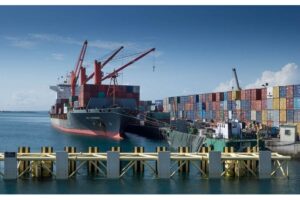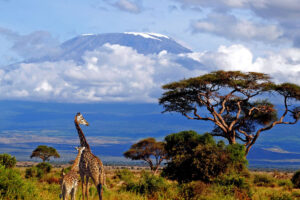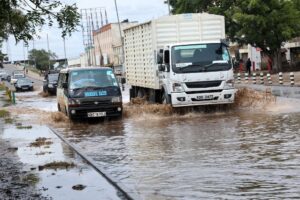On July 29, this year, President Samia Suluhu Hassan launched the Tanzania Digital Economy Strategic Framework.
The framework names the pillars of any digital economy as an enabling digital infrastructure, governance and enabling environment, digital literacy and skills development, digital innovation culture and enabling technologies, nurturing digital inclusion and accessibility and digital financial services. Correspondent PETER KEASI recently held an exclusive interview and briefly discussed the strategy with the Chief Secretary, Ambassador Dr Moses Kusiluka. The Chief Secretary said the government is encouraging the private sector to rise to all emerging opportunities. He said that since the framework has been launched by the president, all Tanzanians and people living in Tanzania, more so the youth, have the duty of building an economy driven by digital technologies and the internet…
QUESTION: Tanzania’s 10-year Digital Economic Strategic Framework was launched by President Samia Hassan on July 29, 2024, is that right?.
ANSWER: Correct. The president launched the strategy during the 15th meeting of the Tanzania National Business Council (TNBC). The meeting was held at the State House in Dar es Salaam.
QUESTION. But some people argue that not much light has been shed on this development of national importance. How do you, very briefly, describe the context of this strategy? How did it come about?
ANSWER: Tanzania belongs to a transformative world. I have had an opportunity in the recent past to state that the entire world is fast moving towards digital transformation. I said Tanzania cannot afford to remain behind. World economies of the future will be propelled and indeed economies are already being driven by digital technologies and the internet. That is why I said Tanzania cannot afford to remain behind.
That fact appreciated, we had to do some homework to achieve the goal of having Tanzania’s economy being part of that kind of emerging world economy. TNBC has working groups of experts that sits over identified subjects and come up with expert proposals or solutions. So the council appointed the TNBC Digital Transformation Working Group. It did a wonderful job. The working group drew Tanzania Digital Economic Strategic Framework that was finally adopted by the government. What I want to emphasise here is the fact that the government cooperated fully with the private sector in formulating this strategy. It adopted it and endorsed its use so that Tanzania can build a competitive economy.
This is the background against which the Tanzania Digital Economic Strategic Framework 2024-34 was conceived, adopted by the government and finally launched by President Samia Suluhu Hassan on July 29, 2024.
QUESTION: Can you, in simple terms, explain what a digital economy framework would mean in any country?
ANSWER: It would mean a theoretical design or model of principles of a digital economy. When you want to build a digital economy, you have to have a model to refer to. In the digital economy package, you will find on one side the Information Communications Technology (ICT) and on the other the digital media and the content on those media. The TNBC working group put it well to answer your question. It said a digital economy framework refers to a conceptual model or structure that describes the key components and principles of an economy driven by digital technologies and the internet.
One will realise that digital technologies and the internet are of paramount importance in driving a digital economy.
In our case, the digital economy framework outlines how Tanzania can harness the power of digital technologies to boost economic growth, create jobs and improve the lives of its citizens.
QUESTION: In a recent interview with journalists, you were emphatic about involvement of the Tanzanian youth in implementing the digital economic framework.
ANSWER: Yes I was. This framework is about transformation; it is about seeing our economy growing healthily, it is about unearthing job opportunities; in short, it is about improving lives of Tanzanians. Young people are the majority of Tanzanians; they need jobs. We need to have an economy that is creating jobs for them. That economy has to be a ticking economy. If you want to have a healthy, growing economy, majority of participants must be young people who are capable of using and benefiting from digital technologies and can use the internet. This is what we are saying. We are encouraging the private sector to rise to this opportunity, to harness the power of digital technologies so that our economy grows fast, in a healthy manner and it creates jobs for young people.
But young people are not expected to sit by, idle around and complain. They need support, alright, but they too have to rise to opportunities; they have an inescapable duty of searching for and using affordable digital literacy and digital technologies; they have to struggle to acquire requisite skills to be employable, employ themselves and creating jobs for others.
In short, we are saying the government has presented the framework and it is encouraging the private sector to rise to all emerging opportunities; the framework has now been launched by the president, all of us, more so the youth, have the duty of building an economy driven by digital technologies and the internet. This is important for us all.
QUESTION: The President’s Office, Local Government and Regional Administration (TAMISEMI), as a ministry, has a unique position in strengthening regional and district TNBC councils. We are told it is using its position positively to ensure TNBC councils promote robust businesses and investment. Is this what is happening on the ground?
ANSWER: Yes, because as you have said, TAMISEMI has a special position that can be used to strengthen TNBC councils at district and regional levels. The meeting adopted a resolution relating the urgent need and importance of strengthening our councils at those two levels.
QUESTION: What would you want to see being done to accommodate the urgency and the importance the TNBC meetings called for?
ANSWER: I would want to see many things done and in a better way. Meetings are of paramount importance. Councils must meet in a scheduled manner. Every district, every region is unique in its own way. The kind of businesses and investment opportunities in one district are different from those you find in the next district or next region. So investment and business challenges in districts and regions can be best addressed right there in TNBC meetings that bring together representatives of private and public sectors. I would want to see one stop centres established, in all districts, to serve the private sector. I would like to see by-laws that are friendly to and promote businesses in every district. Nuisance by-laws do not promote doing business; they undermine investment efforts. It is not only important to have stable and predictable policies and laws at national level, but it is also important to have by-laws in districts that serve our central national mission.
I would like to see TAMISEMI encouraging every district and every region to work towards getting the annual presidential award. The award is given to a region that has done well in creating a helpful and favourable environment for doing business and in attracting investments. The award is a big honour to a recipient region.
ALSO READ: Youth key players in digital economy, says Dr Kusiluka
I would like to see TAMISEMI helping regions and districts which have underperformed in creating conducive environment for doing business and attracting investments. This can be done by way of appropriate facilitation: giving training and requisite resources to leaders of our TNBC councils so that they can perform their duties efficiently. Maybe there is a need now for exploring ways of punishing underperforming regional and district leaders on this particular issue.
I would like to see all districts and regions being enabled by TAMISEMI to provide online services in order to cut down the cost of doing business. Similarly, I would like to see digital collection of revenue from the private sector in all districts and regions.
I would like to see robust cross-border trade in border districts and regions. It is in our national interest to eliminate all obstacles to healthy cross-border trade. We need to increase exports and earn foreign currency. We shall succeed by reducing permit application costs, licence rates and by building strategic border markets.
In November 2019, TNBC published an interesting study report titled ‘Best Practices and Lesson from Regional and District Level Public Private Dialogues’. This publication is still very relevant and important for all of us to read.
QUESTION: You underscore the need for increased exports in order to increase foreign currency. Ports are important in increasing exports?
ANSWER: That is correct. The meeting called for proper supervision relating to consolidation and de-consolidation in our ports.
QUESTION: Was there a resolution on tax administration and laws relating to incentives between Zanzibar and Mainland?
ANSWER: There was one. It called for having fresh look on the two aspects and remove hindrances.
QUESTION: What did the meeting say on tourism?
ANSWER: The meeting called for diversification of tourism products. It also called for a convincing strategy that will help Tanzania promote coastal tourism. It also called for promotion of southern circuit tourism.
Source: allafrica.com














